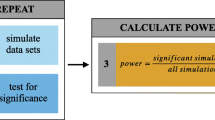Abstract
Randomized response (RR) techniques are used to gather information of a sensitive nature. Optimal sampling strategies for estimating a finite population total under a superpopulation model have been derived by utilizing auxiliary information suitably in constructing the RR techniques.
Similar content being viewed by others
References
Chaudhuri, A. (1987). Randomized response surveys of a finite population: A unified approach with quantitative data. Journal of Statistical Planning and inference. 15, 157–165.
Eriksson, S. A. (1973). A new model for randomized response. International Statistical Review. 41, 40–43.
Horvitz, D. G. & Thompson, D. J. (1952). A Generalisation of sampling without replacement from a finite universe. Journal of the American Statistical Association. 47, 663–685.
Warner, S. L. (1965). Randomized response: A survey technique for estimating evasive answer basis. Journal of the American Statistical Association. 60, 63–69.
Author information
Authors and Affiliations
Rights and permissions
About this article
Cite this article
Arnab, R. Randomized response surveys: Optimum estimation of a finite population total. Statistical Papers 39, 405–408 (1998). https://doi.org/10.1007/BF02927102
Received:
Revised:
Issue Date:
DOI: https://doi.org/10.1007/BF02927102




